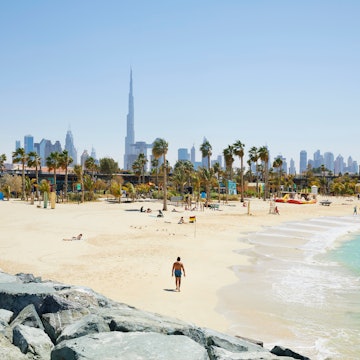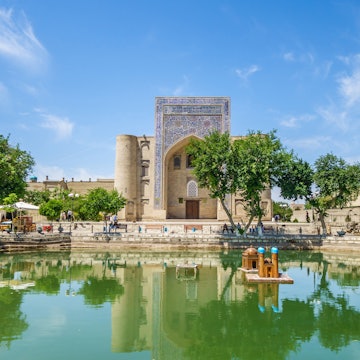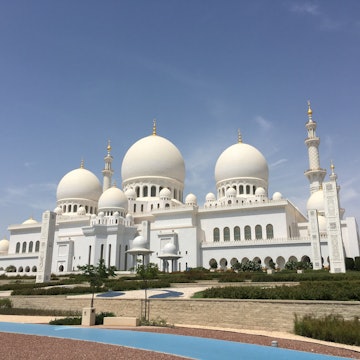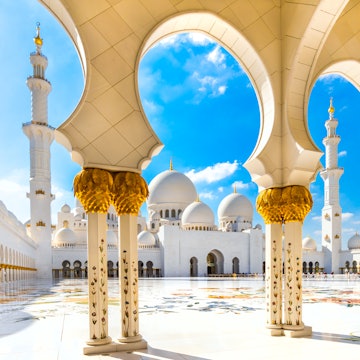

Sheikh Zayed Grand Mosque, Abu Dhabi. Christian Häcker/500px
With its rich cultural heritage, sublime landscapes, vibrant food scene and kind-hearted people, Abu Dhabi is a delight. The capital of the United Arab Emirates fosters a sense of unhurried living where people take the time to chat. They’ll even go out of their way to show you around an art gallery or point you in the right direction should you find yourself looking for a certain bakery in a maze of backstreets.
With a sizable expatriate population in the UAE, Emiratis are no strangers to Western culture, but familiarizing yourself with Abu Dhabi’s cultural norms and etiquette makes every interaction more respectful. These practical tips can help you plan your itinerary and know what to expect in terms of weather, general health and safety.
Planning for your trip to Abu Dhabi
1. Allow at least 4 days
Spread over 67,340 sq km, Abu Dhabi is the largest emirate in the UAE. Besides the Rub al Khali (the world’s largest continuous sand desert), it’s home to rugged mountains, a 700km-long coastline and nearly 200 islands – all offering diverse experiences that are best savored with an itinerary that doesn’t feel rushed.
While you’ll find museums, shopping malls, skyscrapers, theme parks and mangroves in Abu Dhabi city, the emirate is also home to Al Ain, where fortresses, oases, ancient tombs and mountains offer an unexpected glimpse of the UAE’s history. Traveling around Abu Dhabi slowly gives you the chance to venture out to the verdant oases of Liwa and admire the gigantic orange-red dunes of Rub Al Khali, a drive of 2 hours and 30 minutes from the capital.

2. Pack clothing and shoes for the outdoors
To fully appreciate Abu Dhabi’s wealth of outdoor experiences, craft an itinerary that includes activities like cycling along the Corniche, kayaking through the tidal lagoons of Jubail Mangrove Park, practicing your golf swing among saltwater lakes and sand dunes at Saadiyat Beach Golf Club and exploring the mighty dunes around Liwa Oasis by fat bike.
Depending on the season, bring clothes, shoes and a hat that are suitable for your activities. Compared to the mild weather in the city and coast, temperatures in the interior region (such as the desert and mountains) can reach extremes. It’s a good idea to bring layers, especially if you plan on visiting between November and March. In summer, breathable fabrics like cotton and linen make it easier to cope with the heat and humidity.
Getting around Abu Dhabi
3. Download the Abu Dhabi Taxi app
If you plan on getting around Abu Dhabi by taxi, download the Abu Dhabi Taxi booking app (App Store and Google Play) on your smartphone in advance. You’ll thank yourself for doing so when you see tourists trying to hail one on the street in 40°C (104°F) weather.
The app connects you to the nearest available taxi, which usually arrives at your location in under 10 minutes. You can also book a wheelchair-friendly taxi using the app. Being able to specify your pick-up and drop-off locations means that you’re less likely to get lost, even when trying to reach a hole-in-the-wall biryani restaurant in Downtown Abu Dhabi.
For use in the wider country, use the UAE-based Careem smartphone app to book rides.

4. Hop on the free shuttle or take the public bus
The complimentary Experience Abu Dhabi Shuttle Bus service connects eight routes around the city and attractions such as the Louvre Abu Dhabi, Qasr Al Hosn, Qasr Al Watan and Sheikh Zayed Grand Mosque. These modern air-conditioned buses are wheelchair-accessible and are an excellent way to explore Abu Dhabi Island, Saadiyat Island and Yas Island.
To travel on public buses in Abu Dhabi and Al Ain, buy the prepaid Hafilat Smart Card at the Abu Dhabi Central Bus Station or any branch of the supermarket chain Lulu Hypermarket. Load money onto it using the recharge machines at bus stations. To pay, scan in and out on the validator in the buses.
Etiquette in Abu Dhabi
5. Dress for your activity
To be respectful while visiting a museum, the markets in Al Mina or cultural sights such as Qasr Al Hosn and Wahat Al Karama, wear opaque clothing that is not figure-hugging, covers your shoulders and falls well below the knee. This is also the appropriate way to dress while visiting Al Ain or smaller towns in the Liwa Oasis.
At religious sites like the Sheikh Zayed Grand Mosque, both men and women who are not modestly dressed in loose, opaque clothing that covers their arms and legs are asked to wear a robe over their clothes (you can buy one from a nearby shop, if there are none to borrow). At the Sheikh Zayed Grand Mosque and Abrahamic Family House, women will need a scarf to cover their heads.
To dine at a restaurant or visit a mall, dress as you would in any other city, keeping in mind that the locals are always well-groomed. Feel free to show off your style at nightclubs and bars that are located inside hotels.
For women, swimsuits and bikinis are acceptable at hotel swimming pools and public and private beaches. That being said, you’re more likely to see women in one-piece swimsuits and modest swimming attire on public beaches that aren’t located in expat-heavy residential areas. Female travelers might find it useful to carry a scarf or a shirt to cover their shoulders and arms if needed.
Wearing clothing traditionally associated with a different gender is illegal and can incur fines and a minimum of six months of jail time.

6. Respect privacy when photographing public spaces
While photographing sights around Abu Dhabi, pay attention to where your lens is pointed. Don’t take photos of people, especially women and children, without permission.
In the UAE, it’s illegal to photograph or take videos of people without their consent and share them on social media. While it’s unlikely that you’ll be arrested for taking a photo of an attraction where other people also appear, wait until they have moved out of the frame. Never attempt to zoom in and take portrait-style photos (of recognizable faces) without explicit consent.
7. Learn the local greeting and phrases
English is widely spoken but you’re likely to be greeted with the Emirati greeting “as salam alaykum”. Transcending the casual courtesy of an English “Hello”, it translates to “peace be upon you.” Responding with “walaykum as salam” and using “shukran” (thank you) in Arabic will earn you the appreciation of locals.
8. Familiarize yourself with the rules of social interaction
When meeting an Emirati of the opposite sex, don’t reach out for a handshake. Wait for them to offer their hand first; it is likely that instead you will be greeted with a smile and them placing their right hand on their heart as a mark of respect – you should respond the same way.
Physical contact among members of the same sex is common, usually as handshakes (always with the right hand) when you’re getting acquainted. Emirati men may also greet each other with a nose-to-nose kiss or cheek-to-cheek kisses, with the latter also being common among Emirati women.

9. Be aware of the rules of non-verbal communication
In Emirati culture, non-verbal communication is important, so be conscious of your body language, especially in formal situations. Whether in a majlis, an Emirati home, or a government office, don’t sit with your knees crossed over each other, or with one leg resting on the other knee such that your foot is pointing at or your sole is facing someone – both are considered insulting.
Pointing at someone with your index finger, beckoning with it or wagging it while emphasizing your point is rude.
Use your right hand to accept or offer something, such as a cup of gahwa (Arabic coffee) or money, and to eat (the left hand is reserved for the toilet).
Rude gesturing (showing someone the middle finger) and hurling profanities is illegal and can lead to fines, imprisonment and deportation.
10. Show respect during Ramadan
The month of Ramadan is a time of prayer for Muslims who fast from dawn to sunset. For those not fasting, food and drinks are readily available during the day at restaurants and cafes in shopping malls, hotels and elsewhere.
The law requires that non-Muslim visitors only eat and drink (including water and chewing gum) at restaurants and designated spots (such as mall food courts) out of consideration for those fasting. Most non-fasting residents maintain discretion as a matter of social courtesy. You will not be arrested for sipping water outside on a hot day, but do your best to do so out of sight, and be ready to apologize if required.
Don’t blast loud music in public places – use headphones instead. Modest dressing in clothes that cover the shoulders and legs is appreciated.

11. Know the code of conduct at the Sheikh Zayed Grand Mosque
The Sheikh Zayed Grand Mosque is an active place of worship where physical contact between visitors, even when posing for a photograph, is inappropriate. Don’t touch, hold hands or have an arm around your companion while having photos taken – security will approach you and ask you to delete the photo. You’re not allowed to gesture (so no victory signs or thumbs up). Don’t attempt to lie down on the exquisite carpet while taking photos inside the prayer halls.
12. There is no tolerance for drunken behavior
In Abu Dhabi, alcohol is available at licensed restaurants and bars, and consumption of alcohol in unauthorized locations (such as a public beach) is illegal. While it's perfectly acceptable to have a good time, there is zero tolerance for rash, loud and aggressive behavior as a result of having had one too many. That means swearing, rude gestures, picking fights or causing a public nuisance are all illegal and punishable by imprisonment and fines.
13. Don’t drink and drive, even over short distances
Driving under the influence of alcohol is a crime in the UAE and can result in imprisonment and fines upwards of Dhs20,000 should you find yourself in an accident. If you plan on drinking, leave the rental car behind and take a taxi instead.

14. Public displays of affection are frowned upon
Kissing, hugging and other public displays of affection are frowned upon, and prohibited at religious sites such as the Sheikh Zayed Grand Mosque. These days, holding hands does not raise eyebrows, but use your judgment according to the setting. It’s probably okay to do so in a shopping mall or at the beach, but not at the fish market or the Abrahamic Family House. Same-sex relationships are illegal in Abu Dhabi – see the safety section below for more information.
Safety in Abu Dhabi
15. Abu Dhabi has anti-LGBTQ+ laws
Homosexuality is a criminal offence in the UAE that can result in prison sentences, hefty fines and deportation. Discretion is highly advised regarding public displays of affection – kissing and fondling are an offense – for both LGBTQ+ and heterosexual travelers. Also beware that dressing in clothing traditionally associated with a different gender is illegal and can incur fines and jail time. Human Dignity Trust has more information on how the law in UAE can impact LGBTQ+ travelers.
16. Rates of petty crime are among the lowest in the world
Abu Dhabi is the kind of city where you could forget your wallet or passport in a taxi or mall food court, and you’re almost certain to find it there or have it returned to you by someone, cash and cards intact. Petty crimes such as pickpocketing and theft are uncommon. It’s generally safe for everyone to walk around late at night.
17. Make note of emergency numbers
In case of emergencies and the need for rescue, evacuation or urgent medical assistance, contact Abu Dhabi Police on 999.














